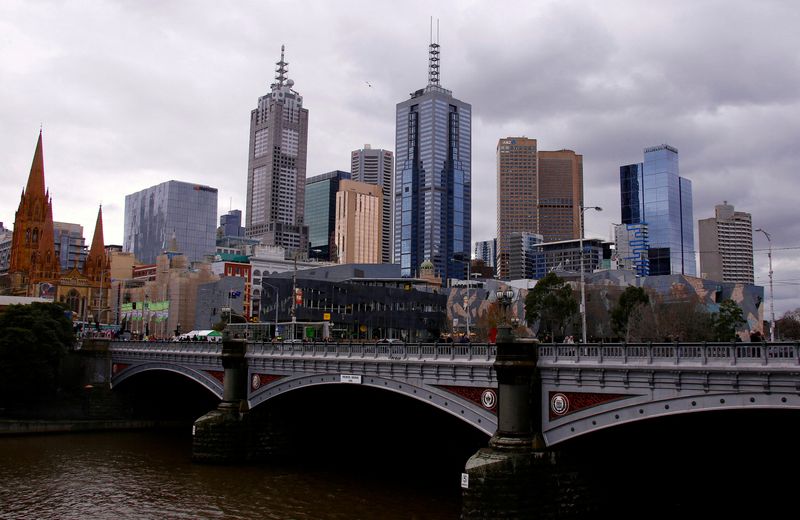Australia Q2 business investment hits highest in 7-1/2 years
2023.08.31 02:52

© Reuters. FILE PHOTO: The central business district (CBD) of Melbourne can be seen from the area located along the Yarra River called Southbank located in Melbourne, Australia, July 27, 2016. REUTERS/David Gray/File Photo
By Wayne Cole
SYDNEY (Reuters) – Australian business investment climbed to its highest since late 2015 in the June quarter as firms took advantage of tax breaks to splurge on new equipment, while plans for future spending were also upgraded in a much-needed boost to the economy.
Data from the Australian Bureau of Statistics on Thursday showed private capital spending climbed a real 2.8% in the second quarter from the previous quarter, handily beating forecasts of a 1.2% increase.
Spending of A$37.58 billion ($24.43 billion) was the highest since late 2015, while investment in equipment reached a record peak of A$17.53 billion.
The construction sector boasted the biggest gains as firms finally received deliveries of machinery and vehicles after lengthy supply-chain delays.
Firms also lifted spending plans for the fiscal year to June 2024 to A$157.8 billion, up 14.5% on the previous quarter.
The strength in investment is a welcome shot in the arm to economic growth given rising interest rates and painfully high inflation has taken a heavy toll on consumer spending.
Figures for gross domestic product (GDP) for the June quarter are due next week and analysts are tipping growth of only around 0.3%. That would see the annual pace slow to just 1.8%, the lowest since early 2021 when the economy was emerging from pandemic lockdowns.
Indeed, an extended period of sub-par growth lies ahead as the Reserve Bank of Australia (RBA) tries to curb inflation with interest rates at decade highs of 4.1%.
Inflation figures for July out on Wednesday suggested the policy was working, albeit gradually, and markets assume rates will again be held steady at the RBA’s September policy meeting next week.
Investors also suspect the entire tightening cycle might now be over as futures imply only around a 40% chance of a hike by year end.
Nomura economist Andrew Ticehurst cautioned there was a risk of perhaps one final rate rise in November, though it would be a very close call.
“At the same time, the latest data support our broader views that the economy will skirt with recession and inflation will ease further over coming quarters, and that the RBA could commence a more aggressive easing cycle than is currently priced, next year,” he said.
He is tipping three quarter-point cuts in 2024 starting in May, while markets are leaning toward just one easing late in the year.
($1 = 1.5370 Australian dollars)








